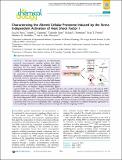| dc.contributor.author | Ryno, Lisa M. | |
| dc.contributor.author | Genereux, Joseph C. | |
| dc.contributor.author | Naito, Tadasuke | |
| dc.contributor.author | Morimoto, Richard I. | |
| dc.contributor.author | Powers, Evan T. | |
| dc.contributor.author | Shoulders, Matthew D. | |
| dc.contributor.author | Wiseman, R. Luke | |
| dc.date.accessioned | 2018-02-12T16:06:56Z | |
| dc.date.available | 2018-02-12T16:06:56Z | |
| dc.date.issued | 2014-04 | |
| dc.date.submitted | 2014-01 | |
| dc.identifier.issn | 1554-8929 | |
| dc.identifier.issn | 1554-8937 | |
| dc.identifier.uri | http://hdl.handle.net/1721.1/113575 | |
| dc.description.abstract | The heat shock response is an evolutionarily conserved, stress-responsive signaling pathway that adapts cellular proteostasis in response to pathologic insult. In metazoans, the heat shock response primarily functions through the posttranslational activation of heat shock factor 1 (HSF1), a stress-responsive transcription factor that induces the expression of cytosolic proteostasis factors including chaperones, cochaperones, and folding enzymes. HSF1 is a potentially attractive therapeutic target to ameliorate pathologic imbalances in cellular proteostasis associated with human disease, although the underlying impact of stress-independent HSF1 activation on cellular proteome composition remains to be defined. Here, we employ a highly controllable, ligand-regulated HSF1 that activates HSF1 to levels compatible with those that could be achieved using selective small molecule HSF1 activators. Using a combination of RNAseq and quantitative proteomics, we define the impact of stress-independent HSF1 activation on the composition of the cellular proteome. We show that stress-independent HSF1 activation selectively remodels cytosolic proteostasis pathways without globally influencing the composition of the cellular proteome. Furthermore, we show that stress-independent HSF1 activation decreases intracellular aggregation of a model polyglutamine-containing protein and reduces the cellular toxicity of environmental toxins like arsenite that disrupt cytosolic proteostasis. Collectively, our results reveal a proteome-level view of stress-independent HSF1 activation, providing a framework to establish therapeutic approaches to correct pathologic imbalances in cellular proteostasis through the selective targeting of HSF1. | en_US |
| dc.publisher | American Chemical Society (ACS) | en_US |
| dc.relation.isversionof | http://dx.doi.org/10.1021/CB500062N | en_US |
| dc.rights | Article is made available in accordance with the publisher's policy and may be subject to US copyright law. Please refer to the publisher's site for terms of use. | en_US |
| dc.source | ACS | en_US |
| dc.title | Characterizing the Altered Cellular Proteome Induced by the Stress-Independent Activation of Heat Shock Factor 1 | en_US |
| dc.type | Article | en_US |
| dc.identifier.citation | Ryno, Lisa M. et al. “Characterizing the Altered Cellular Proteome Induced by the Stress-Independent Activation of Heat Shock Factor 1.” ACS Chemical Biology 9, 6 (April 2014): 1273–1283 © 2014 American Chemical Society | en_US |
| dc.contributor.department | Massachusetts Institute of Technology. Department of Chemistry | en_US |
| dc.contributor.mitauthor | Shoulders, Matthew D. | |
| dc.relation.journal | ACS Chemical Biology | en_US |
| dc.eprint.version | Final published version | en_US |
| dc.type.uri | http://purl.org/eprint/type/JournalArticle | en_US |
| eprint.status | http://purl.org/eprint/status/PeerReviewed | en_US |
| dc.date.updated | 2018-02-06T18:27:30Z | |
| dspace.orderedauthors | Ryno, Lisa M.; Genereux, Joseph C.; Naito, Tadasuke; Morimoto, Richard I.; Powers, Evan T.; Shoulders, Matthew D.; Wiseman, R. Luke | en_US |
| dspace.embargo.terms | N | en_US |
| dc.identifier.orcid | https://orcid.org/0000-0002-6511-3431 | |
| mit.license | PUBLISHER_POLICY | en_US |
